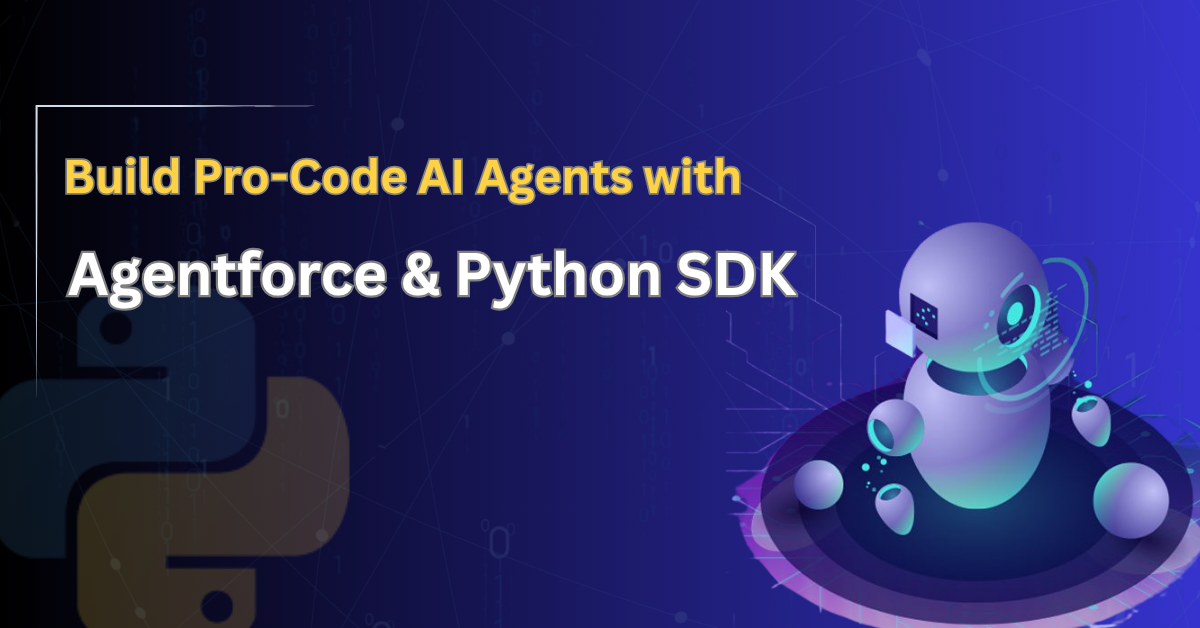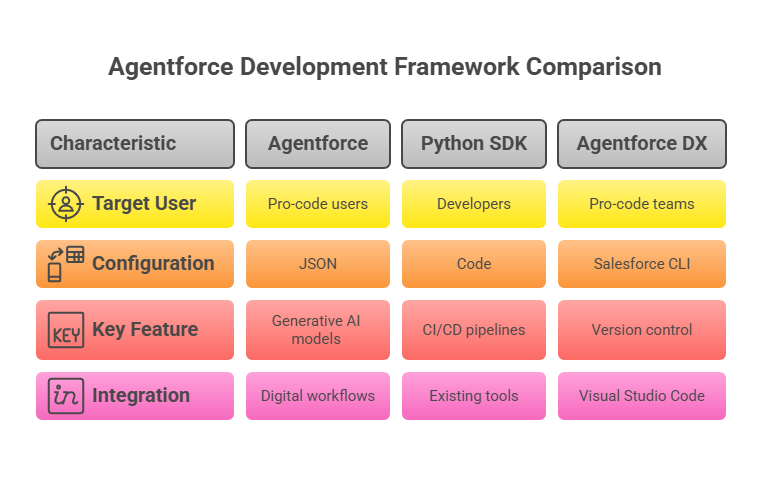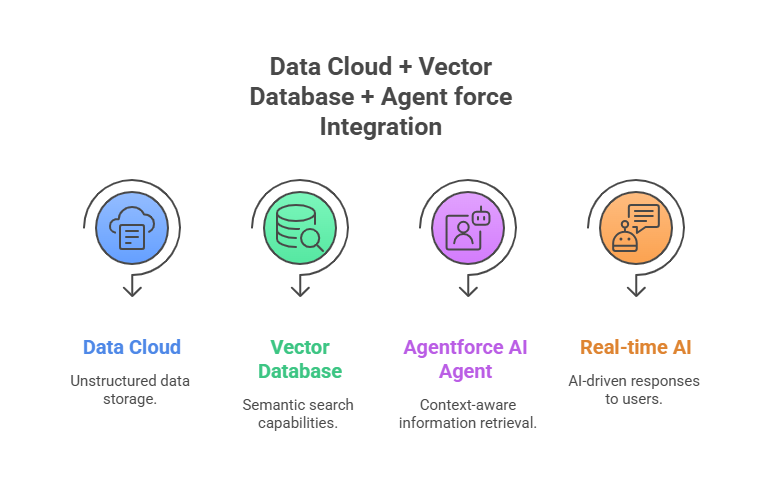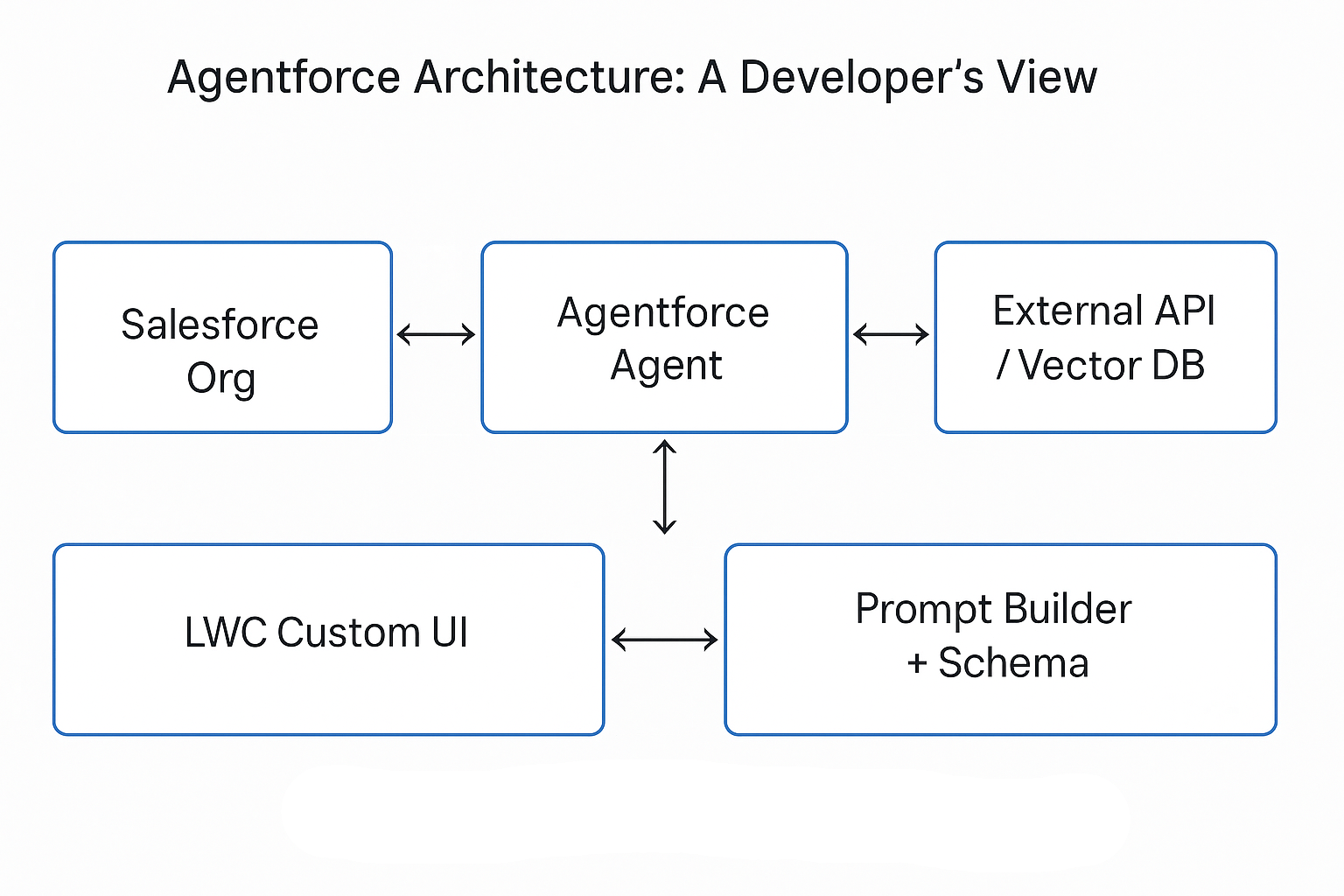Building Smarter with Salesforce Agentforce: The Future of AI-Driven Development
Salesforce expands AI access with pro-code innovations

Introduction: Embracing the New Salesforce AI Era
With the Salesforce Summer ’25 Release, developers gain access to some of the most potent tools the platform has ever introduced. Agentforce, Salesforce’s generative AI framework, is central to this evolution, which is poised to transform how developers design, deploy, and scale intelligent digital experiences.
This release represents a massive leap forward for pro-code developers building on the Salesforce platform, from the new Python SDK and Salesforce DX integration to enhancements in Lightning Web Components (LWCs) and Data Cloud.
This blog explores everything you need about Agentforce and the Summer ’25 upgrades, offering insights into the new tools, use cases, and architectural impacts for enterprise developers and architects.
What is Agentforce?
Agentforce is Salesforce’s advanced AI agent development framework designed for pro-code users, enabling developers to:
- Define prompt templates
- Manage agent configurations using JSON.
- Leverage generative AI models for adaptive conversations and intelligent task handling.
- Embed AI in digital workflows.
Agentforce provides developers with everything they need to build custom, intelligent agents that interact with Salesforce data, external systems, and users in meaningful, contextual ways.

Python SDK: Pro-Code Meets AI
One of the most exciting introductions is the Agentforce Python SDK, designed for developers who want complete programmatic control over their AI agents.
Key Features:
- Create and manage agents using Python
- Define prompts and behaviors in code.
- Interact with a JSON-based agent configuration file.
- Enable CI/CD pipelines for agents.
Why It Matters:
This SDK enables AI development to become part of mainstream dev workflows, allowing seamless integration with existing tools like Git, Jenkins, or GitHub Actions.
Agentforce DX (Beta): AI Meets Salesforce DX
Agentforce DX integrates Agentforce development into Salesforce Developer Experience (DX), enabling pro-code teams to:
- Build and deploy AI agents using Salesforce CLI
- Use Visual Studio Code extensions for rich AI development.
- Organize agents into project-based repositories.
Pro Tip:
Agentforce DX enables version-controlled AI development—perfect for regulated industries where traceability and testing are essential.

Lightning Web Components for Agentforce (Developer Preview)
Salesforce allows you to build custom UI components for AI agents using Lightning Web Components (LWCs). With Lightning Type Bundles, developers can:
- Build structured, dynamic UIs
- Create editors, custom renderers, and schema-based visual interactions.
- Design an intuitive, AI-enhanced interface.s
These components elevate the AI experience, offering seamless interaction between users and AI agents within Salesforce apps.
Agent Connections (Beta)
Agentforce enables adaptive response delivery through Agent Connections. Think of it as giving your agents the ability to send:
- Rich links
- Clickable choices
- Interactive cards
These responses work across digital engagement channels like chat, email, or Slack.
Real-World Use Case:
A customer service agent could use Agentforce to dynamically generate follow-up options post-interaction (e.g., "Do you want to schedule a call or get an email summary?") without manual input.
Prompt Builder + External Objects
Salesforce’s Prompt Builder now supports External Objects, allowing developers to:
- Integrate large-scale data from external systems
- Ground AI responses without storing data in Salesforce
This plays a crucial role in Retrieval-Augmented Generation (RAG) workflows, where access to real-time data ensures that AI delivers accurate and highly relevant responses.
Example:
A healthcare AI agent can pull data from an external medical database and provide compliance-safe answers, without the data ever being stored in Salesforce.
Data Cloud + Vector Database: Powering RAG
The Salesforce Summer ’25 release introduces Vector Database Integration to Data Cloud. This unlocks:
- Storage of unstructured data (like documents or reviews)
- Support for semantic search via embeddings
- Real-time access to context-aware information
Paired with Agentforce, this enables RAG-powered experiences where users interact with dynamic, accurate, and explainable AI agents.
Industry Example:
A manufacturer could ask an AI agent, "Why did our product fail in Q2 in Germany?" The agent would retrieve feedback, reports, and logs from vector databases to deliver a grounded answer.

Mobile & Web AI Interactions
AI agents are now accessible via Salesforce Mobile SDKs and embedded web components, supporting real-time, context-aware experiences.
Use cases include:
- Real-time customer support
- On-the-go workflow automation
- Embedded AI interfaces within portals or third-party sites
Apex & API Enhancements
API Version Retirement Tools:
Salesforce is introducing new updates in response to the upcoming deprecation of API versions 21.0 to 30.0:
- Event Log Browser: Identify deprecated APIs
- Version Enforcement Tools: Audit and block usage
Apex Enhancements:
- Better async processing with AI-related tasks
- Improved JSON handling for agent responses
- Integration with Lightning Type Bundles
Custom LWC Interfaces for AI Agents
With Agentforce and LWC integration, developers can:
- Build custom agent interfaces
- Pass context dynamically (user data, object records)
- Integrate third-party visuals into agent workflows.
This means agents are no longer black boxes—they become interactive, explainable, and user-driven components.
Developer Tools for AI
| Tool | Purpose |
|---|---|
| Python SDK | Pro-code agent creation and lifecycle management |
| Salesforce CLI | Agent deployment and integration with DevOps pipelines |
| VS Code Extensions | Syntax highlighting, testing, and debugging of Agentforce agents |
| External Objects & Prompt Builder | Pull dynamic, external data into generative responses |
| LWC for Agentforce | Build UI-based, contextual agent experiences |
| Event Log Browser | Track deprecated API usage |
Use Cases by Industry
Industry Use Case Impact And full table with this applied:
| Industry | Use Case | Impact |
|---|---|---|
| Retail | Conversational product search using vector DB and AI prompts | Improved customer satisfaction and faster discovery |
| Finance | Fraud detection agents that learn from historic cases via unstructured logs | Real-time alerts and better pattern recognition |
| Healthcare | Compliance agents trained on external regulatory databases | Reduced legal risk and improved documentation |
| Education | Student progress agents pulling LMS data from external systems | Personalized learning and intervention strategies |
| Manufacturing | Equipment diagnostics agents use logs and maintenance reports | Reduced downtime, predictive repairs |

Key Takeaways:
- Agents are independent, composable units
- Prompt templates and schema are stored and editable.
- Contextual UIs via LWC help visualize decisions
- Vector search or external APIs enrich agent intelligence.
Conclusion: Future-Proofing with Agentforce
Salesforce’s Summer ’25 release signals a new frontier for enterprise AI development. With tools like the Python SDK, Agentforce DX, Lightning Type Bundles, and vector databases, developers are empowered to build:
- Context-aware, real-time agents
- Embedded AI across desktop, mobile, and web
- Enterprise-grade, secure, and explainable AI workflows
If you’re a developer looking to bring generative AI into Salesforce, there’s no better time than now to upskill in:
- Prompt engineering
- Vector search
- LWC UI design for AI
- DX-first agent lifecycle management
The future of AI in CRM is composable, context-driven, and pro-code, and Agentforce is your toolkit to lead the way.
Curious about what’s new in Salesforce Summer’25?

FAQ's
1. How does Agentforce enhance AI development in Salesforce?
Agentforce empowers developers to build intelligent agents using prompts, JSON configs, and external data for dynamic, context-aware workflows.
2. What is the Agentforce Python SDK used for?
It allows pro-code developers to define agents, manage configurations, and integrate AI workflows into CI/CD using tools like Git or Jenkins.
3. What role do Vector Databases play in Agentforce?
Vector DBs enable semantic search and real-time access to unstructured data, powering more accurate Retrieval-Augmented Generation (RAG) responses.
4. How does Agentforce DX support version-controlled AI?
Agentforce DX integrates with Salesforce CLI and VS Code, allowing versioning, testing, and deployment of AI agents in a structured DevOps flow.
5. Why are Lightning Web Components important for Agentforce?
LWCs help developers build visual, interactive agent UIs, making AI experiences more intuitive and explainable within Salesforce apps.

